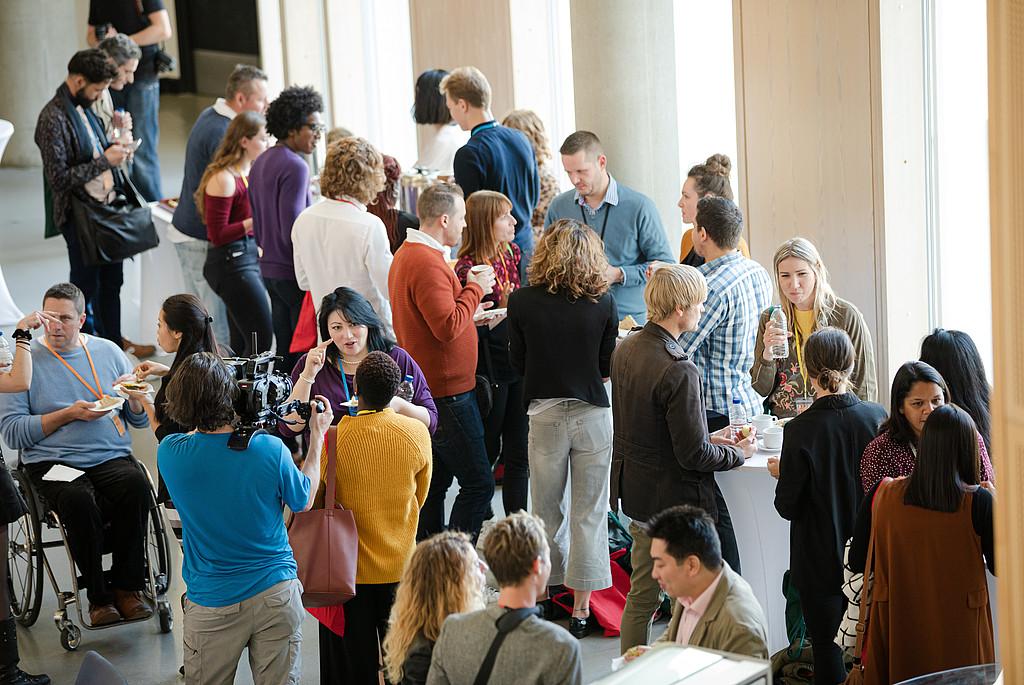The Graduate Center is open to all junior researchers at the University of Passau (doctoral candidates, postdoctoral candidates, post-doctoral candidates, junior professors, and tenure-track professors) and to anyone interested in pursuing a doctorate or habilitation at the University of Passau.
On this page you will find the most important information for postdoctoral researchers at the University of Passau.

The habilitation serves to formally establish your teaching qualification (facultas docendi) and is the formal prerequisite for appointment to a professorship in many subjects. The concrete requirements for this teaching qualification and your scientific independence vary from subject to subject.
In the case of habilitation, the designation of the subject for which you are habilitating is central, since it will later influence your application possibilities. Habilitation is possible at all faculties of the University of Passau. Details are regulated by the respective habilitation regulations. If you have any questions about these, please contact the respective dean's offices.
Following the habilitation, you can apply for a teaching authorization (Venia Legendi). This entitles you to teach independently at your faculty. At the same time, you are obliged to teach so-called titled courses in order to maintain your authorization to teach.
The early postdoc phase follows the doctoral phase and usually lasts about two years. It differs from later stages of the postdoc phase primarily in that during this time there is often still time to read up on the dissertation project and that it is precisely during this time that the course for the future career path must be set ("orientation"). At the latest in this phase, a decision should be made as to whether a permanent stay in academia or a transition to the non-university labor market is desired, because a change usually becomes more difficult the longer someone remains in academia after the doctorate or the early postdoc phase.
The early postdoc phase can be followed by the advanced postdoc phase as a research associate. In 4 to 8 years - depending on the position situation and on the "saved time doing a PhD" in the sense of the Wissenschaftszeitvertragsgesetz - the habilitation or habilitation-equivalent achievements are made.

Alternatively, there is the possibility to conduct independent research as a junior research group leader or on a junior professorship, to supervise staff members and thus to demonstrate suitability for a tenured professorship by successfully filling a position similar to the job profile of a W2 or W3 professorship. In all three variants of the late postdoc phase, a central task with regard to the career path is to raise one's academic profile, i.e., to make oneself known further ("profiling") through lectures, publications, third-party funding, collaborations and teaching, project coordination, and academic self-administration.
Both in the advanced postdoc phase as a research associate and in the junior professorship and junior research group leadership, the task of applying for permanent professorships arises after the first 2 to 4 years (appointment phase). The appointment phase thus runs partly parallel to the junior professorship, junior research group leadership or advanced postdoc phase. Since specific requirements and qualification tasks arise here, it is nevertheless considered a separate phase.
The postdoc phase ends either with the transition to a W2 or W3 professorship or with the individual decision not to pursue the scientific qualification towards a professorship any further. The latter is often associated with a move to the non-university labor market, but can also be a decision during an existing employment relationship that does not include further scientific qualification per job description.

Since 2007, the Wissenschaftszeitvertragsgesetz (WZVG) has regulated how employment contracts for scientific and artistic staff at state universities and research institutions can be limited in time. The core of the law is the twelve-year rule: each qualification stage (doctorate and habilitation) may not last longer than six years, i.e. 6+6=12. After 12 years, employees should only be employed on a permanent basis or have been appointed to a professorship or chair in the meantime.
The rule does not apply, however, if you work in a third-party funded position. However, their contract periods are generally counted. So if you have worked in a third-party funded project for two years after your doctorate, then you only have four years left for your habilitation.
In order to prevent short-term contracts for young scientists, the Wissenschaftszeitvertragsgesetz has been amended. The amendment to the law has been in effect since March 17, 2016. One of the goals of the German government's 2021 coalitiuon agreement is to improve working conditions in science and academia, and to this end, among other things, to reform the Wissenschaftszeitvertragsgesetz on the basis of the evaluation of the effects of the amendment to the law.
For more information, visit the website of the Federal Ministry of Education and Research (BMBF) and the DFG. You may also want to familiarize yourself with the text of the law and/or the Ministry's case collection, and please contact the Human Resources Department with any questions about your contract situation.
To become eligible for professorship, postdocs must build a portfolio that includes the following areas:
What specific requirements - such as the breadth and depth of your expertise or the extent of your teaching experience - look like varies widely from research area and discipline.
Junior scientists need and develop numerous skills during their qualification phases. What is (already) expected of you, depending on your discipline, varies greatly. The competencies that you will develop in the course of your doctorate, postdoc phase or habilitation are just as varied.
The Graduate Center supports you in meeting the phase-specific requirements of your postdoc phase and in expanding your interdisciplinary competencies. Therefore, we offer you the possibility to expand your scientific skills through our range of events!
In several publications, the University Association for the Qualification of Young Scientists in Germany (UniWiND) has developed a common framework with which competence profiles of young scientists can be described and thus also supported by measures. The competence clusters include:
Links to UniWiND:
The Centre for Transfer and Start-up Promotion supports the scientists of the University of Passau in project planning and networking with partner companies from the business world.

The Transfer Centre has three spheres of activity. First, the Transfer Centre is to intensify and project the knowledge transfer activities beyond the disciplines, faculties and University. In particular, for knowledge transfer it has the following remit:
Further Information and contact are available on the Website of the Tranfer Centre.

In 2019, the DFG renewed their guidelines for safeguarding good scientific practice (DFG Code of Conduct).
„Wissenschaftliche Integrität bildet die Grundlage einer vertrauenswürdigen Wissenschaft. Sie ist eine Ausprägung wissenschaftlicher Selbstverpflichtung, die den respektvollen Umgang miteinander, mit Studienteilnehmerinnen und -teilnehmern, Tieren, Kulturgütern und der Umwelt umfasst und das unerlässliche Vertrauen der Gesellschaft in die Wissenschaft stärkt und fördert. (…) Die Wissenschaft selbst gewährleistet durch redliches Denken und Handeln, nicht zuletzt auch durch organisations- und verfahrensrechtliche Regelungen, gute wissenschaftliche Praxis.“
(Leitlinien zur Sicherung guter wissenschaftlicher Praxis – DFG Kodex, September 2019).
"Scientific integrity forms the basis of trustworthy science. It is a manifestation of scientific self-commitment, which includes respectful treatment of each other, study participants, animals, cultural assets and the environment, and strengthens and promotes society's indispensable trust in science. (...) Science itself ensures good scientific practice through honest thought and action, not least through organizational and procedural regulations."
(Guidelines for Ensuring Good Scientific Practice - DFG Code, September 2019).
Adherence to the principles of good scientific practice is essential for good scientific work. The University of Passau supports you as an early career researcher in adhering to the following principles:
Good scientific practice...
In accordance with its legal responsibility for the organization of research, teaching and the promotion of young scientists, the University of Passau has issued the rules for safeguarding good scientific practice and for dealing with scientific misconduct (only available in German). These rules are based on the Guidelines for Safeguarding Good Scientific Practice of the German Research Foundation (Deutsche Forschungsgemeinschaft) and are mandatory for all academically active members of the University of Passau and are part of the training of young academics. The contact point for questions of good scientific practice or in cases of suspected scientific misconduct is the Permanent Commission for the Investigation of Allegations of Scientific Misconduct.
The professional and responsible handling of research data is an essential basis of scientific work and an important part of good scientific practice.
Research data management is a component of good scientific practice and was included in 2019 by the German Research Foundation (DFG) in its guidelines for safegurarding good scientific practice (Guidelines 7, 10-15, 17). Consequently, this means that - irrespective of third-party funding - the respective subject-specific standards and methods should be taken into account when collecting, processing and analyzing research data, and the handling of research data throughout the entire research process should be documented in a transparent and traceable manner. Research data management covers the entire "data life cycle": from the initial planning of the research project, through the review, collection, preparation, processing and analysis, to the securing, publication or, for example, deletion of the research data.
The School of Business and Economics and Information Systems at the University of Passau is committed to countering structural inequalities in science and the academic system with a culture of integrity and transparency. A core objective of the Code of Values is to prevent inequality from becoming injustice. The goals of the School of Business and Economics and Information Systems include in particular
(1) open communication about unequal structures,
(2) dealing constructively and appreciatively with the negative psychological, social and emotional effects of unavoidable structural inequalities and
(3) reducing the potential for abuse of these structures by members of the academic system.
The faculty organises training courses and workshops on the Code of Values at least once a year.
The University of Passau supports all habilitation candidates for the duration of the habilitation procedure with an annual individual grant, with an annual budget of € 1,500.
The funding is initially granted for two years and, in the event of a successful interim evaluation, is continued for the entire duration of the habilitation procedure.
The budget is allocated to a separate cost center and can be used for research-related expenses (travel expenses, literature, IT needs, printing and copying costs, personnel expenses for student assistants, etc.).

The Graduate Centre and the Executive Support Unit Diversity and Gender Equality offers an opportunity to network with other doctoral candidates at the University of Passau as part of its mentoring programmes.
The Graduate Centre's peer mentoring programme "NaWi" supports those interested in doing a doctorate by providing them with advanced doctoral students or postdocs as peer mentors. Regular networking meetings are also part of the programme. If you are interested volunteering as a mentor for the promotion of young researchers at the University of Passau, you are welcome to contact us at any time. Within the framework of the programme, you will have the opportunity to meet and exchange ideas with the other programme participants.
The women's mentoring programme mentUP+ supports young female academics in their career planning. MentUP* is the University of Passau's diversity mentoring programme. It is aimed at young academics and managers with diversity characteristics. In addition to mentoring and coaching, strategic networking with other mentees and mentors is promoted through regular networking meetings within both programmes.

The Faculty of Economics offers the opportunity to exchange ideas with other young researchers at subject-specific research seminars. The brown bag seminars are offered in these areas:
At the Faculty of Computer Science and Mathematics, faculty-wide colloquia are held on Tuesdays from 5 pm during the lecture period.

The Representative Council for Academic and Artistic Staff (Mittelbau-Konvent) represents the interests of all non-professorial academic staff at the University of Passau, including academic councillors, academic staff, academic assistants, lecturers, teachers for special tasks and teaching assistants.
It represents the interests of the academic Mittelbau in the university's bodies and committees and is the point of contact for problems. In addition, the Mittelbau-Konvent invites all its members to a social meeting once a semester.

The Welcome Centre of the University of Passau is the central contact and advice point for the support of international (young) academics. This includes advice and support on residence issues, insurance, finding accommodation, access to the university's infrastructure (ZIM ID & CampusCard), support for accompanying family members and promotion of integration.
The Welcome Centre regularly organises international dinners, cultural events or excursions where contact can be made with other international researchers at the University of Passau.

In the Internet and Digitisation Network Eastern Bavaria (INDIGO), the six Eastern Bavarian universities - OTH Amberg-Weiden, TH Deggendorf, Landshut University of Applied Sciences, University of Passau, University of Regensburg and OTH Regensburg - pool their scientific expertise in the field of Internet and digitisation. The INDIGO network supports the scientists in the network in relevant activities, for example by promoting research cooperation, creating exchange and networking opportunities and strengthening awareness of the existing scientific expertise at the participating universities.
Within the framework of the INDIGO events, the professional exchange between the scientists on current issues, research results and innovative research approaches, the (cross-university) knowledge transfer and the internal networking are promoted.